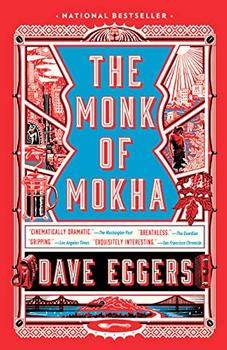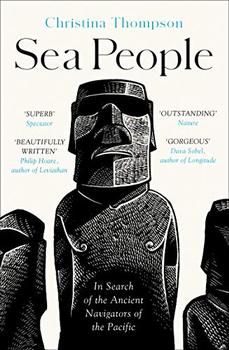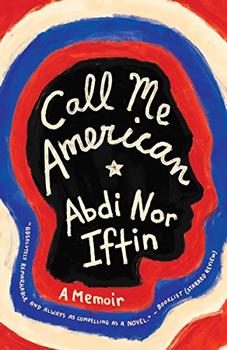Summary | Excerpt | Reading Guide | Reviews | Beyond the book | Read-Alikes | Genres & Themes | Author Bio

Dave Eggers is an engaging storyteller with a flair for dramatic moments, and his biography of Yemeni American entrepreneur Mokhtar Alkhanshali combines a well-paced series of heroic misadventures with fascinating coffee facts. The narrative spans continents, cultures and centuries to explore the history of coffee and to describe current events in Yemen. Mokhtar is characterized as a complex, modern Sinbad the Sailor, venturing far to make his rags-to-riches dream come true.
Mokhtar comes of age in the Tenderloin, one of San Francisco's poorest neighborhoods, where he is a restless student and mischief-maker. Worried about his future when he finishes eighth grade, Mokhtar's parents send him to live with his grandparents in rural Ibb, Yemen. His grandfather, Hamood – the well-to-do patriarch of the family, who in earlier years owned grocery stores in New York – introduces young Mokhtar to a rich Yemeni heritage, Arabic language, and "a thousand proverbs and maxims" which guide Mokhtar's future.
Upon returning to the US and finishing high school in San Francisco, Mokhtar has ambition to attend college, but not the means. He takes a series of jobs including Honda car salesman and luxury apartment doorman. Mokhtar's first flash of inspiration happens at work when a friend points out that the nearby statue of the Hills Brothers coffee guy looks Yemeni. When Mokhtar asks his mother, Bushra, if there is coffee in Yemen, she replies, "Yemenis basically invented coffee. You didn't know this?"
The Monk of Mokha unravels stereotypes about Arab culture. Readers meet individual Yemenis: coffee growers Malik and his widow, and the village skeptic known as The General. Mokhtar's grandfather Hamood is a larger-than-life elder who follows traditions and also understands life in America. His father, Faisal, is living his own version of the immigrant's American dream: he works long hours as a San Francisco Muni bus driver to support the family and uphold traditional Islamic values in a neighborhood known for sex, drugs, nightclubs, and crime. Other minor characters include militant Houthi separatists, citizen resistance fighters, Arab businessmen, coffee dealers, and tech experts. In airports, Mokhtar experiences an ever-present fear of being detained due to being non-white. While traveling in Yemen, he is uncertain whether a US passport will be his death sentence or a free pass out of trouble. Mokhtar wants Yemen to be known for something "besides drone strikes and Al Qaeda".
One morning when Sana'a (the capital) is being bombed, Mokhtar seeks refuge in a mosque. "When the Imam asked God to forgive the sins of those present, the men around him wept, and Mokhtar knew he might die there, that at any moment a bomb would rip through the roof. Had it been a good life? Mokhtar thought. He wasn't sure. It was incomplete. He should have started all this coffee business sooner, he thought." Mokhtar's company is now delivering coffee to discerning customers, and creating opportunity for Yemeni coffee growers. There's a note in The Monk of Mokha that proceeds from the book will benefit The Mokha Foundation, dedicated to improving the quality of life for people in Yemen.
This book's design reminds me of a treasure chest. A handsome red and brown hardcover with embossed gold artwork, an interior rich with elegant typesetting, and a map of Yemen make it ideal for gifting, especially if paired with coffee.
![]() This review was originally published in The BookBrowse Review in February 2018, and has been updated for the
January 2019 edition.
Click here to go to this issue.
This review was originally published in The BookBrowse Review in February 2018, and has been updated for the
January 2019 edition.
Click here to go to this issue.

If you liked The Monk of Mokha, try these:

by Christina Thompson
Published 2020
A blend of Jared Diamond's Guns, Germs, and Steel and Simon Winchester's Pacific, a thrilling intellectual detective story that looks deep into the past to uncover who first settled the islands of the remote Pacific, where they came from, how they got there, and how we know.

by Abdi Nor Iftin
Published 2019
The incredible true story of a boy living in war-torn Somalia who escapes to America--first by way of the movies; years later, through a miraculous green card.
Your guide toexceptional books
BookBrowse seeks out and recommends the best in contemporary fiction and nonfiction—books that not only engage and entertain but also deepen our understanding of ourselves and the world around us.